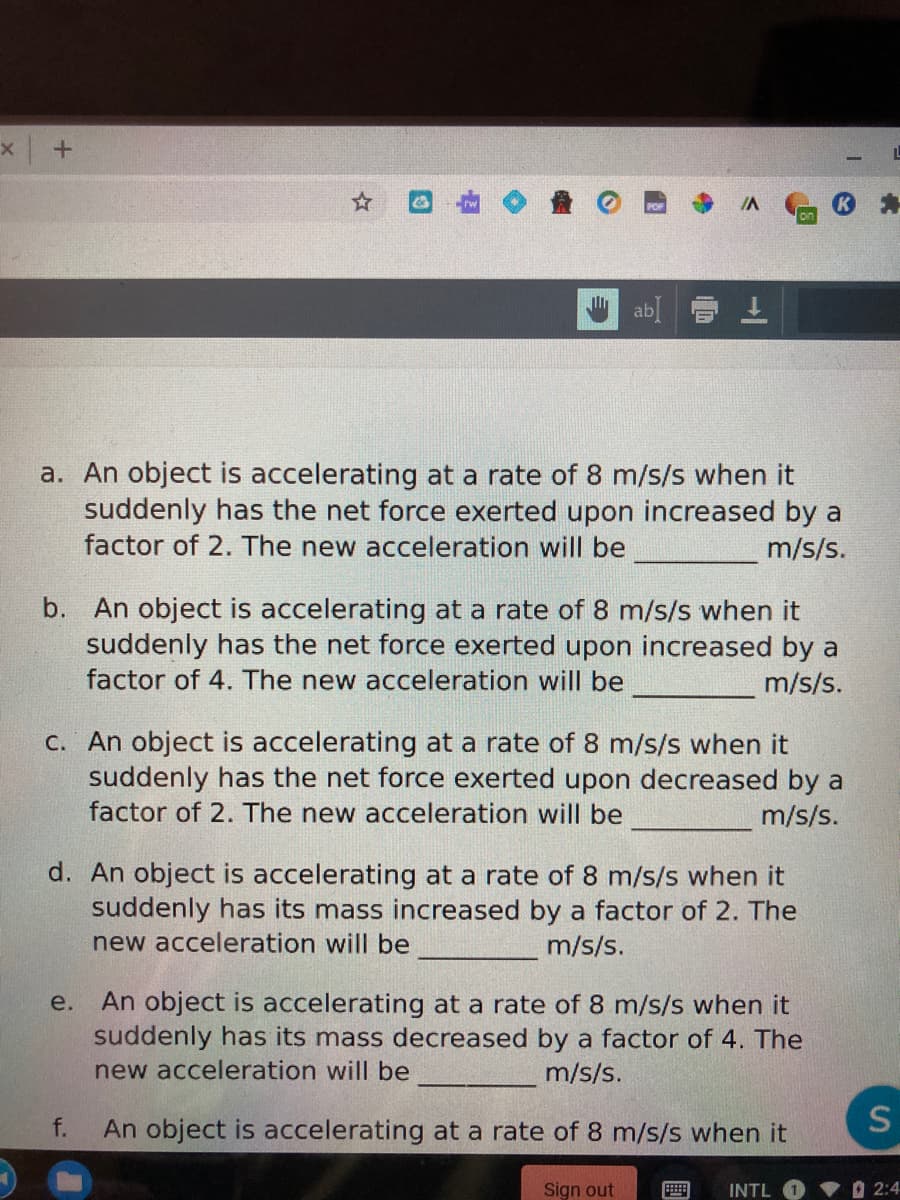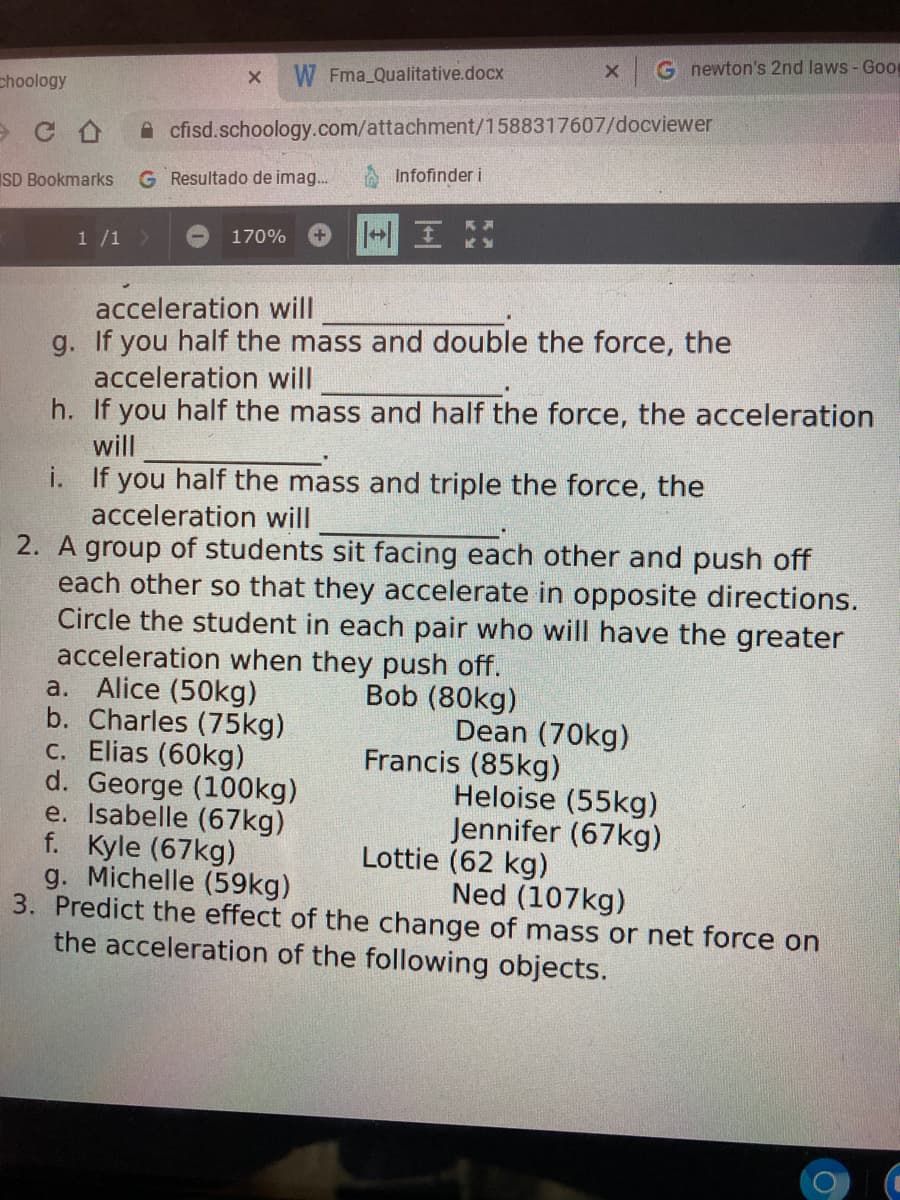An object is accelerating at a rate of 8 m/s/s when it suddenly has the net force exerted upon increased by a factor of 2. The new acceleration will be m/s/s. An object is accelerating at a rate of 8 m/s/s when it suddenly has the net force exerted upon increased by a factor of 4. The new acceleration will be m/s/s. An object is accelerating at a rate of 8 m/s/s when it suddenly has the net force exerted upon decreased by a factor of 2. The new acceleration will be m/s/s.
An object is accelerating at a rate of 8 m/s/s when it suddenly has the net force exerted upon increased by a factor of 2. The new acceleration will be m/s/s. An object is accelerating at a rate of 8 m/s/s when it suddenly has the net force exerted upon increased by a factor of 4. The new acceleration will be m/s/s. An object is accelerating at a rate of 8 m/s/s when it suddenly has the net force exerted upon decreased by a factor of 2. The new acceleration will be m/s/s.
University Physics Volume 1
18th Edition
ISBN:9781938168277
Author:William Moebs, Samuel J. Ling, Jeff Sanny
Publisher:William Moebs, Samuel J. Ling, Jeff Sanny
Chapter5: Newton's Law Of Motion
Section: Chapter Questions
Problem 27P: Astronauts in orbit are apparently weightless. This means that a clever method of measuring the mass...
Related questions
Question
I need help on this asap

Transcribed Image Text:IA
a. An object is accelerating at a rate of 8 m/s/s when it
suddenly has the net force exerted upon increased by a
factor of 2. The new acceleration will be
m/s/s.
b. An object is accelerating at a rate of 8 m/s/s when it
suddenly has the net force exerted upon increased by a
factor of 4. The new acceleration will be
m/s/s.
C. An object is accelerating at a rate of 8 m/s/s when it
suddenly has the net force exerted upon decreased by a
factor of 2. The new acceleration will be
m/s/s.
d. An object is accelerating at a rate of 8 m/s/s when it
suddenly has its mass increased by a factor of 2. The
new acceleration will be
m/s/s.
An object is accelerating at a rate of 8 m/s/s when it
suddenly has its mass decreased by a factor of 4. The
new acceleration will be
e.
m/s/s.
f.
An object is accelerating at a rate of 8 m/s/s when it
S
Sign out
INTL
O 2:4

Transcribed Image Text:G newton's 2nd laws - Good
W Fma Qualitative.docx
choology
A cfisd.schoology.com/attachment/1588317607/docviewer
G Resultado de imag.
Infofinder i
SD Bookmarks
1 /1>
170%
acceleration will
g. If you half the mass and double the force, the
acceleration will
h. If you half the mass and half the force, the acceleration
will
i. If you half the mass and triple the force, the
acceleration will
2. A group of students sit facing each other and push off
each other so that they accelerate in opposite directions.
Circle the student in each pair who will have the greater
acceleration when they push off.
a. Alice (50kg)
b. Charles (75kg)
c. Elias (60kg)
d. George (100kg)
e. Isabelle (67kg)
f. Kyle (67kg)
g. Michelle (59kg)
3. Predict the effect of the change of mass or net force on
the acceleration of the following objects.
Bob (80kg)
Dean (70kg)
Francis (85kg)
Heloise (55kg)
Jennifer (67kg)
Lottie (62 kg)
Ned (107kg)
Expert Solution
This question has been solved!
Explore an expertly crafted, step-by-step solution for a thorough understanding of key concepts.
This is a popular solution!
Trending now
This is a popular solution!
Step by step
Solved in 4 steps

Knowledge Booster
Learn more about
Need a deep-dive on the concept behind this application? Look no further. Learn more about this topic, physics and related others by exploring similar questions and additional content below.Recommended textbooks for you

University Physics Volume 1
Physics
ISBN:
9781938168277
Author:
William Moebs, Samuel J. Ling, Jeff Sanny
Publisher:
OpenStax - Rice University

Glencoe Physics: Principles and Problems, Student…
Physics
ISBN:
9780078807213
Author:
Paul W. Zitzewitz
Publisher:
Glencoe/McGraw-Hill

College Physics
Physics
ISBN:
9781938168000
Author:
Paul Peter Urone, Roger Hinrichs
Publisher:
OpenStax College

University Physics Volume 1
Physics
ISBN:
9781938168277
Author:
William Moebs, Samuel J. Ling, Jeff Sanny
Publisher:
OpenStax - Rice University

Glencoe Physics: Principles and Problems, Student…
Physics
ISBN:
9780078807213
Author:
Paul W. Zitzewitz
Publisher:
Glencoe/McGraw-Hill

College Physics
Physics
ISBN:
9781938168000
Author:
Paul Peter Urone, Roger Hinrichs
Publisher:
OpenStax College

Physics for Scientists and Engineers: Foundations…
Physics
ISBN:
9781133939146
Author:
Katz, Debora M.
Publisher:
Cengage Learning